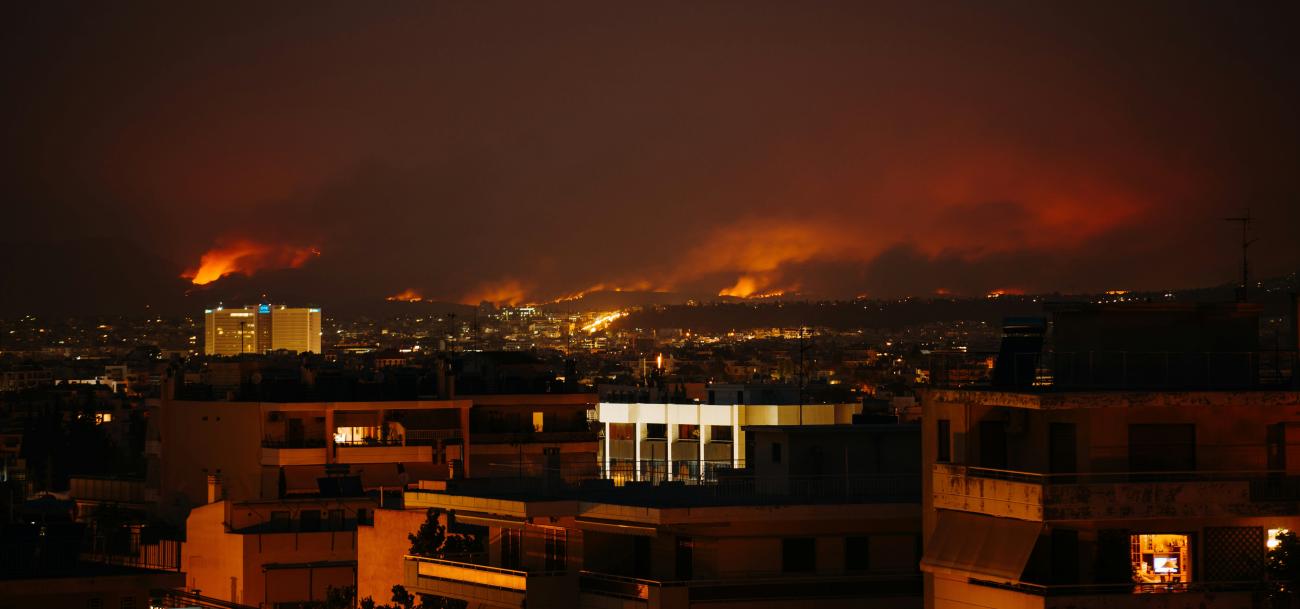
From the beginning of the year until the end of August 2025, more than 473,000 acres of land in Greece were turned to ash, according to the European Commission’s Copernicus Emergency Management Service. That makes this year the fifth-worst wildfire season of the past two decades. Greece burns every summer, and the state's response remains dangerously lacklustre.
Overreliance On Evacuation Alerts
Greece uses the European Union’s 112 emergency number that's designed to warn citizens of nearby dangers and inform them if they need to evacuate the area. It works; people get out alive. But it means surrendering forests and wildlife to destruction.
It also dismisses the heartache and anguish of families watching their whole life's work go up in flames.
“Houses are being rebuilt, and trees will grow back” said Prime Minister Kyriakos Mitsotakis back in 2021. He is a member of one of Greece’s largest political dynasties, which stretches all the way back to the ‘Maker of Modern Greece,’ Eleftherios Venizelos. For someone with 41 properties, rebuilding may seem simple. For ordinary people, losing a home means losing the centrepiece of their lives, their memories, and often their livelihoods.
Forced To Make An Impossible Decision
During the 2021 fires on North Evia, the island's citizens followed the government's instructions and evacuated en masse.
More than 2,000 people were transported to safety. The government prioritised deploying large aerial firefighting resources, including helicopters and airplanes. However, ground firefighting efforts were limited and sometimes ineffective due to understaffing and a defensive firefighting policy focused mainly on protecting homes on roadsides rather than controlling the fire perimeter inside the forest. This led to the fire spreading extensively until it reached the sea, which resulted in the most destructive wildfire in Greece's history.
On the other hand, during the 2023 fires on Corfu, after witnessing how the government handled the fires in North Evia, its citizens made the dangerous choice to ignore evacuation alerts. They organized, they stayed and fought, and through their collective effort, they managed to save their properties and countless animal lives.
These two cases present citizens with a horrific dilemma that they shouldn't have to choose from.
Evacuate and likely lose everything, or risk your life to save what is yours.
The Human Cost of Understaffing
A member of the Hellenic Parliament for the ruling party, New Democracy, claimed that Greece doesn’t need more professional firefighters, only more volunteers.
Volunteers are essential, but they cannot replace trained professionals.
Panagiotis Plexidas, volunteer firefighter, lost his life battling flames in 2020. In 2024, Andreas Andreadis, a seasonal firefighter, died in a crash after being forced to work a continuous 34-hour shift, a clear violation of labor regulations.
Their sacrifices highlighted the incredible bravery of citizens and the unacceptable risks created by an understaffed fire department. A situation the government perpetuates by relying on volunteers and seasonal workers instead of investing in a fully manned and well-equipped professional force.
Heroes in Summer, Criminals in Winter
Each summer, government officials shower firefighters with praise. Their sacrifice is hailed and their bravery applauded on every twist and turn. But when the same firefighters protest for better working conditions, more manpower, and modern equipment, the government greets them with riot police, flash bangs, tear gas and water cannons.
Hazard Pay for Bureaucrats, Not Firefighters
While firefighters were risking their lives, parliament clerical staff were granted retroactive hazardous work allowances for office duties, which sparked controversy and public outrage among firefighters.
Seasonal firefighters, whose jobs involve smoke inhalation, heat exhaustion, and mortal danger, publicly criticized that carrying water glasses through Parliament’s corridors or suffering wrist strain from typing could be considered “hazardous,” their own dangerous work was only partially compensated or delayed.
“Every day we throw ourselves into the flames, we count burns, we breathe cancer, and we mourn colleagues in the battle with fire. If all this is not considered ‘hazardous and unhealthy,’ then apparently the real battle is being fought in Parliament’s air conditioning and staplers.”
The government later introduced new hazardous duty pay and retroactive salary increases for professional and seasonal firefighters starting October 2025, but this did little to quell the frustration about the perceived unfairness and timing of the parliament’s allowance.
You Can’t Put a Band-Aid on a Festering Wound
Greece cannot continue this cycle.
We’ve had different governments, different parties, different prime ministers over the years, but all of them have been ineffective when it comes to dealing with wildfires. The names change, but the forests keep burning. Families keep losing everything while politicians offer the same empty promises.
When the government allows forests to burn, they are erasing parts of our identity and our heritage.
The Tree of Hippocrates, under which the Father of Medicine taught his students, and the oldest olive tree in the world, the Olive Tree of Vouves in Crete, which has stood for thousands of years, remind us that nature itself carries our history. Every summer, these fires turn Greece bit by bit from one of the most gorgeous countries on earth into a barren wasteland.
We don't want to spend every summer waiting for that emergency text telling us it's time to run. We don't want future generations to think that burning forests, evacuated villages, and suffocating smoke are just normal parts of life.
Climate change has already lengthened fire seasons, making wildfires more intense and unpredictable. Yet the government chooses to rely on mass evacuation and volunteers rather than ensuring that fire departments are fully staffed and properly equipped to meet the ever-growing demands of wildfires.
And unless that changes, every Greek summer will remain a season of loss.
The state must finally treat firefighting as the national priority it is. Otherwise, every summer will continue to bring the same devastation. Countless ecosystems and animal lives lost, homes destroyed and families uprooted.
Content Disclaimer: The views & opinions expressed in this article are those of the author and do not necessarily reflect the views of VoiceBox, affiliates, and our partners. We are a nonpartisan platform amplifying youth voices on their stories and the topics they are passionate about.
Support Young Creators Like This One!
VoiceBox is a platform built to help young creators thrive. We believe that sharing thoughtful, high-quality content deserves pay even if your audience isn’t 100,000 strong.
But here's the thing: while you enjoy free content, our young contributors from all over the world are fairly compensated for their work. To keep this up, we need your help.
Will you join our community of supporters?
Your donation, no matter the size, makes a real difference. It allows us to:
- Compensate young creators for their work
- Maintain a safe, ad-free environment
- Continue providing high-quality, free content, including research reports and insights into youth issues
- Highlight youth voices and unique perspectives from cultures around the world
Your generosity fuels our mission! By supporting VoiceBox, you are directly supporting young people and showing that you value what they have to say.





